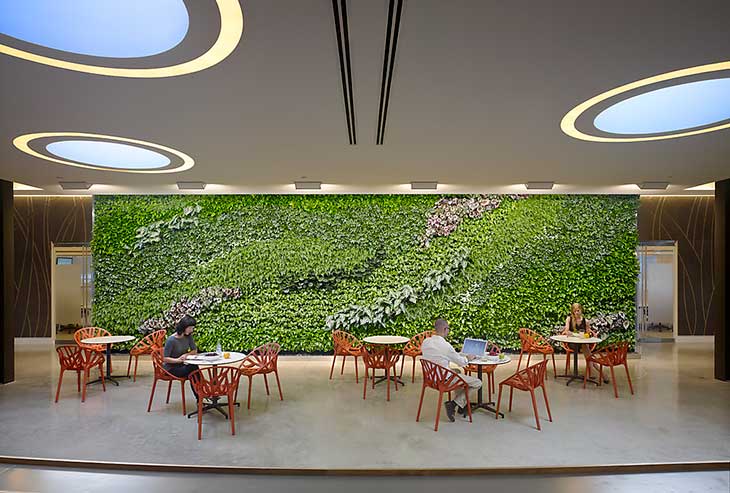Today’s society is more urban, digital and fast-paced than ever before. The downside of this is the overall loss of our connection to nature and the outdoors. As designers, we have a role and an opportunity to positively affect the fundamental ways people interact with space. We can accomplish this by creating spaces to live, work and play that incorporate elements of the natural environment into the overall experience.
Biophilia is the idea that humans possess an innate tendency to seek connections with nature and other forms of life. It stems from the Greek meaning “love of life.” Biophilic design applies these principles to the built environment, incorporating nature in a deep and fundamental way.
At 2015’s HD Expo in Vegas, I had the honour of joining Bill Browning, founder of Terrapin Bright Green, to lead a discussion on “The Next Stage of Green: Biophilic Design in Hospitality.” To me, biophilic design is exciting because it complements and transcends sustainability and truly embraces our connection with nature to alleviate anxiety and stress. It’s not just aesthetics. It is a thoughtful approach that incorporates elements of nature, whether to a building skin or the interior environment of a hotel.

Image © Gensler
Research indicates that biophilic design can increase well-being in the workplace and healthcare facilities. Patients recover quicker with natural (vs. urban) window views, reducing their hospital stays. In workplaces with natural scenery and light, employees are healthier, taking fewer sick days. Studies show that designs that incorporate ecological aspects minimise stress levels, reduce mental fatigue and elevate mood. These strategies can enhance health, productivity and learning, positively impacting the bottom line.
Biophilic design in hospitality
Biophilic design can also be very powerful in the hospitality industry. A cost-effective way to enhance the guest experience, it can bolster feelings of community, while improving well-being and health. Daylighting, which boosts our production of melatonin, can help guests get a better night sleep, vastly improving their hotel stay. Boosting once experience all creates a guest stronger affinity to a hotel brand and a more memorable guest experience. Hotel staff also prove to be more productive and happier, and guests are more likely to return.
At Gensler, we are working with our clients who want to go beyond sustainability to examine different ways to enhance the guest experience. We are experimenting with new manufacturers to develop products that can implement biophilia into our design. This goes beyond printing a pattern of leaves onto a metal panel or fabric element. Our brain craves the complexity that the natural world brings to our lives. In recent years, brain science has discovered surprising ways that our brain can heal itself. Stimulating the brain with positive influences like biophilic design can strengthen our neural network, which supports our well-being.
We are working with several clients and applying biophilic design principles when designing interiors, incorporating a deeper connection to nature and complex patterns replicating nature. We also look at ways to incorporate Terrapin’s four design elements for the Nature of Space in our planning: prospect, refuge, mystery and risk/peril. This creates different environments and experiences for guests, replicating the natural environment.
Biophilic design: what’s next?
By tapping into our innate inclinations toward nature, we can simulate good feelings of refuge, growth and development. Studies have shown that viewing an attractive complex fractal pattern can trigger the part of the cerebellum that makes a person want to reach out and connect. With new technologies in computers and 3-D printing we have an opportunity to create fractal design patterns that are more complex, and that can echo natural elements. These principles enable us to not only create a more pleasant experience, but also trigger a deeper affinity to certain brands. The potential is amazing.
Editor’s note: This article originally appeared on Gensler On Lifestyle.